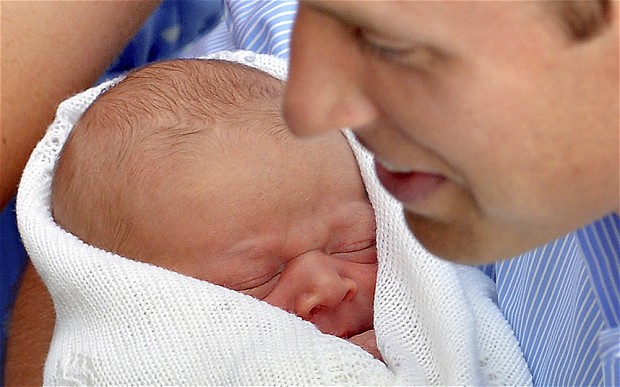IF YOU'RE AS WORN OUT WITH READING ABOUT THE DISGRACEFUL ANTHONY WEINER AS I AM, then I've got just the post for you---a nice journey down history lane and the King Georges that came before the little fellow above, if you haven't already seen this.
Quick! Do you know what number king the latest royal baby boy George will be?
Well, he if he makes it to the throne, then he will be King George VII, the seventh.
So let's look quickly to Georges I-VI and I'll link to the excellent piece yesterday in the Telegraph giving the royal rundown---Royal Baby, the Legacy of Royal Georges.
And FYI, that legacy does not include George Clooney, George Zimmerman or Boy George.
Below is King George I.
From the Telegraph article,
King George I, the eldest son of the Duke of Brunswick-Lüneburg, was born in 1660 and inherited the throne from Queen Anne in 1714, becoming the first Hanoverian king of Great Britain.He spoke very little English, preferring to converse in German and French, and regularly visited Hanover to fulfil other duties. He was left reliant on his ministers, with Whigs dominating Parliament through his reign. According to the official record of the British monarchy, he was known for his “family tensions”, including the imprisonment of his own wife in 1694, and a difficult relationship with his son, George. He died in 1727 during a visit to Hanover.Skipping down a couple of Georges to number III. This is the king of England who lost the American colonies to its drive for freedom and independence from the British Crown:
George III was born on June 4, 1738, and succeeded his grandfather in 1760, becoming the first Hanoverian monarch to be born in Britain and have English as a first language. He is perhaps the best remembered of the Georges, being nicknamed Mad King George after losing his sanity in his latter years. He is also remembered for losing the American colonies. Official literature from the Palace states his popular legacy is “far from the whole truth”. A father of 15 children, some historians believe his instability was caused by a hereditary physical disorder called porphyria. He died in at Windsor Castle in January 1820, after a reign of almost 60 years.If we skip several other intervening kings, the latest George in our time was King George VI who happened to be Queen Elizabeth's father. He was also the subject of the recent movie The King's Speech:
George VI, the Queen’s father, became King in 1936 unexpectedly following the abdication of his brother Edward VIII. Latterly remembered for his stammer, he reigned during the Second World War and remained in Buckingham Palace, visiting bombed-out areas of London with his wife, Queen Elizabeth. He instituted the George Cross and George Medal, for acts of bravery by citizens, and visited troops in France, Italy and North Africa. In 1947, he became the first monarch to go on tour with his family, visiting South Africa with the young Princess Elizabeth and Princess Margaret. Suffering poor health in his later years, he died in his sleep in February 1952 at Sandringham aged 56. He was portrayed by Colin Firth in the Oscar-winning 2010 film The King’s Speech.Isn't it fun to put things in historical perspective? The older I get, the more I love history and stuff like this.




























2 comments:
George VI was christened Albert Frederick Arthur George. He took the slightly unusual choice of reigning as King George rather than Albert because it would give a feeling of stability.
Thank you Treg, did not know that..
Post a Comment